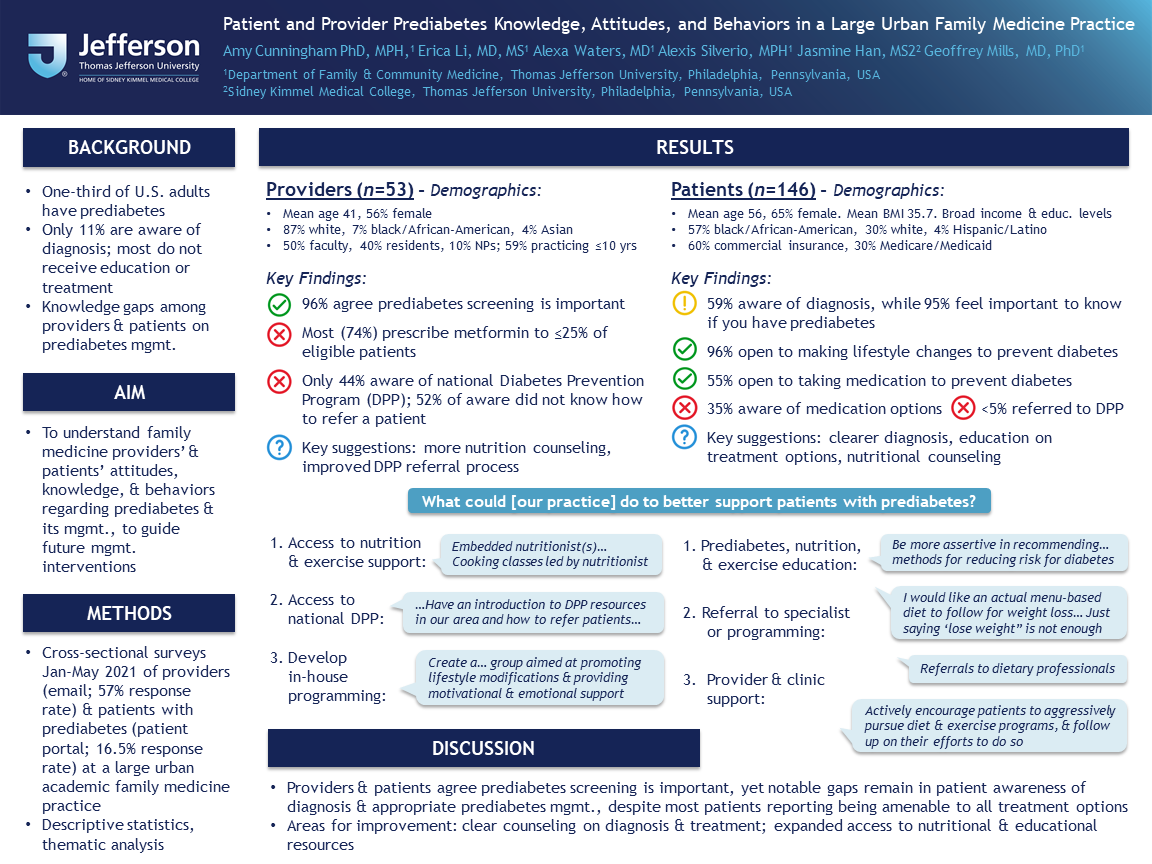PCR042: Patient and Provider Prediabetes Knowledge, Attitudes, and Behavior in a Large Urban Family Medicine Practice (Pearls)
Amy Cunningham, PhD, MPH; Erica Li, MD; Alexis Silverio, MPH; Jasmine Han; Alexa Waters, MD; Geoffrey Mills, MD, PhD
Abstract
Context: One-third of American adults have prediabetes. However, only 11% are aware of their condition, and they often do not receive prediabetes education or management. Prior studies have indicated knowledge gaps among primary care providers and patients on prediabetes management. Objective: To understand family medicine providers’ and patients’ attitudes, knowledge, and behaviors regarding prediabetes and its management to inform a prediabetes management intervention. Study Design: Cross-sectional surveys. Setting: A large academic family medicine practice in downtown Philadelphia with 30,000 patients making 80,000 visits annually. Population studied: Family medicine providers (attending physicians, nurse practitioners, residents) and adult patients seen within the last year, with HbA1c in the last 6 months between 5.7-6.4% (excluding pregnant, diabetes diagnosis). Instruments: Provider survey asking demographics, knowledge, attitudes, management, DPP awareness, barriers to prediabetes treatment, and open-ended question on how the practice could improve prediabetes management. Patient survey asking demographics, awareness of diagnosis and risk, knowledge, attitudes, experiences with DPP, prediabetes experiences with PCP, and same open-ended question as provider survey. Provider survey distributed via email; patient survey via Epic MyChart patient portal. Outcome Measures: Descriptive statistics for all quantitative survey items; thematic analysis of open-ended responses. Results: Fifty-four providers and 148 patients completed the surveys (57% and 16.5% response rates, respectively). Nearly all providers (96%) felt that prediabetes screening and management is important but most (74%) prescribe metformin to ≤ 25% of eligible patients. Over half (56%) were unaware of DPP, and 52% of those aware of DPP did not know how to refer a patient. Over half (59%) of patients reported having been told they have prediabetes and 84% thought diet and lifestyle changes were effective treatment, but 65% were unaware of medication options and only 5% had been referred to DPP. In open-ended responses, providers requested more nutrition counseling and an improved DPP referral process; patients also requested nutrition counseling and classes. Conclusions: Providers and patients saw prediabetes as important but reported knowledge and management gaps, particularly for metformin and DPP, and requested additional practice resources.

Jack Westfall
jwestfall@aafp.org 11/20/2021Great poster and abstract. thanks